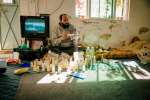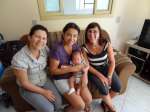- Text size
 |
|  |
|  |
| 
- Français
Annual UNHCR-NGO consultations begin with focus on urban refugees, protracted situations
News Stories, 29 June 2009
GENEVA, June 29 (UNHCR) – Annual consultations between the UN refugee agency and its non-governmental organization (NGO) partners began in Geneva on Monday, with particular focus this year on urban refugees and protracted refugee situations.
Some 380 people from about 140 organizations, including 70 national NGOs, are attending the meeting, which will discuss a wide range of issues of mutual concern over the next three days during regional and thematic sessions.
"It's a time for UNHCR and NGOs to meet at the strategic level and for the senior staff of UNHCR to be available for questions and discussion with our partners from all over, not just the partners from Geneva or the headquarters, but also from the deep field. That's what makes it unique," said Bernard Doyle, head of UNHCR's inter-agency unit.
He said the main themes to be discussed this year were protracted refugee situations, urban refugees and UNHCR's Global Needs Assessment, a worldwide programme aimed at determining the real needs of refugees and internally displaced people, the costs of meeting those needs and the consequences of any gaps.
"We have a session on Global Needs Assessment because that's a big priority and we need to discuss this more with the NGO partners."
Ed Schenkenberg, coordinator of the International Council of Voluntary Agencies, said the meeting would discuss short-term issues and longer-term policy issues. "These consultations are a unique opportunity for interactive dialogue on an equal footing between NGOs and senior UNHCR staff."
He identified some issues of concern, including tighter funding flows, the inter-agency cluster approach in dealing with internally displaced people, and the shrinking humanitarian space in which aid organizations can work and the forcibly displaced find shelter.
Schenkenberg, whose organization helped organize the consultations, expressed particular concern about the situations in Pakistan and in northern Sri Lanka. He mentioned the lack of access to camps in Sri Lanka for aid agencies and the lack of freedom of people in the camps.
He told delegates this trend of restricting the work of international NGOs was seen in a growing number of countries. "I hope we use these consultations also to look at this issue of humanitarian space of NGOs to work in countries such as Sudan, Sri Lanka and others."
UNHCR Assistant High Commissioner for Protection Erika Feller, who was also concerned about the shrinking humanitarian space, told the participants that non-governmental organizations had an incredibly important role in the area of protection.
"Not only as advocacy partners for UNHCR, but as doers of protection, and not only as implementing partners, but as partners in your own right with your own set of objectives, your own mandate responsibilities and your own contributions to make," she added.
We have to be able to work effectively with partners. There is no way UNHCR can deal with all of these issues on its own.
Lloyd Dakin, director, UNHCR Division of External Relations
Lloyd Dakin, director of UNHCR's Division of External Relations, stressed the importance of partnerships for the refugee agency. "We have to be able to work effectively with partners. There is no way UNHCR can deal with all of these issues on its own," he said.
"In an increasingly more complex and challenging environment we have to find ways to undertake our parnerships together as effectively as possible. And that's why these consultations are so important, because this is the opportunity where we can interact and have a true dialogue."
For the past two decades, the annual consultations have brought together NGOs and UNHCR managers to examine all aspects of their partnership on behalf of the world's uprooted people.
NGOs are vital partners for UNHCR, implementing programmes for refugees and internally displaced people in some of the world's most remote and difficult places. The UN refugee agency works with more than 600 NGOs worldwide.






































